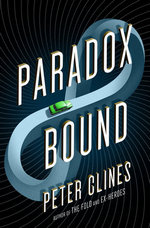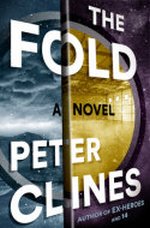 Paradox Bound
Paradox Bound
by Peter Clines
Hardcover, 369 pg.
Crown, 2017
Read: November 8 – 9, 2017

Sanders is a typical American small-town, so typical, I felt like I grew up there. Thankfully, unlike Sanders, the place I grew up in has moved on, Sanders has not. There’s still a Video Rental Store there, for crying out loud. Those who work with computers, or want to have much of an idea about contemporary pop culture, have to move away — or at least commute.
Eli Teague is just such a person — but before he commutes to his IT job from his apartment above the Video Rental Store, he grows up in a pretty typical way. With one exception: twice while growing up, he encounters a young woman dressed incredibly oddly while working on an old Ford Model A, which seems to be fueled by water. They spend a little time conversing each time — typically leaving Eli more confused than he’d have thought possible — then she drives off and disappears. This instills in him an obsession with historic cars, that spills over into American History in general.
As an adult, he encounters her again and inadvertently puts her in danger. He abandons everything he knows in an effort to save her from this and ends up joining her on a hunt through history. Harry (this mysterious woman) travels through history — she’s not a time traveler, she’ll be quick to point out, she travels in history. She’s not crazy about bringing Eli along with her, but literally has almost no choice in the matter.
Harry . . . she’s a great character, and I would’ve appreciated a lot more focus on her, and getting to see much more of her past. Maybe not getting to actually helps, because it makes the reader more curious about her — but I’d still have rather had a better look at her life before Eli became a regular part of it. She’s tough, loyal, cunning — but no superhero, just a strong person.
Short of spoiling the whole thing, this is one of those I have to be very vague about the details, but then why should you read it? I’ll leave it to you to read the book to get more about the hunt they’re on, but I’ll just say that it’s a great idea, a wonderful concept. The other hunters (and allies) we meet are interesting, but man, I’d love more of all of them — there’s some great historical cameos, too. Naturally, we need an opposing force to make things more tense — and we have one of the creepiest around in these pages. They’re not evil, not corrupt, not anything but driven (and with a skewed way of looking at things).
There’s a nostalgic, hopeful tone throughout — despite the sharp critique of the status quo in America. There’s an evident wit behind the words, too, but this isn’t what you’d call a funny novel. I do think that Clines and I would differ a bit on some of the ways he interprets parts of the national character/psyche, but I can appreciate what he was going for (that’s one of those things that’ll make more sense after you read the book). The characters — whether we like them or not — are very human, very relatable, and pretty sympathetic. Clines has again taken some tropes, concepts, ideas that we’re familiar with — some we know very well, but skewing them just a hair and resulting in something we haven’t seen before.
I expected this to be a pretty good read after The Fold a couple of years ago, but I wasn’t expecting something as fresh feeling as this (but with the skill of someone who’s written a few novels). There’s a dash of civics lessons, some cultural commentary, and a lot of hope — things you don’t always get in light(ish) SF. I “bought into” this book much more quickly than I did The Fold, I’m not sure if that’s because Clines earned my trust in the previous book, or if there’s something more accessible about this one — either way, it’s something for the “Plus” column.
Give this one a whirl — you’ll be glad you did.

—–



